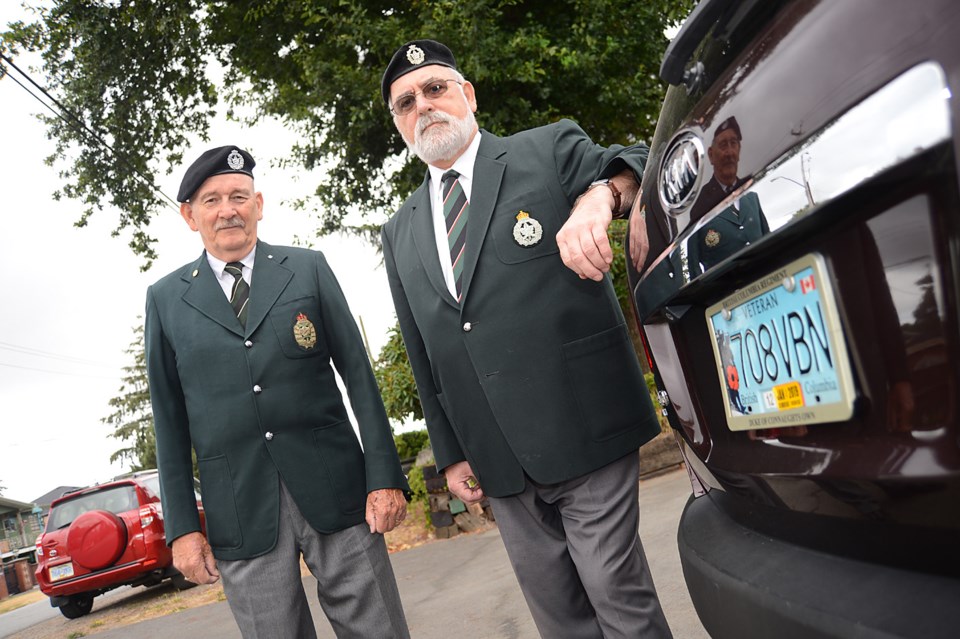Richard Hourie has no problem with first responders being honoured in their own way, just not with an armed forces’ veteran’s licence plate.
Richmondite Hourie, 69, – who rose to the rank of captain while serving for 23 years in Germany with the 8th Canadian Hussars and in Vancouver with the British Columbia Regiment – is one of many veterans upset with a B.C. government survey which asks if retired RCMP members should qualify for the veterans plate.
Hourie is the vice-president of the B.C. Veterans Commemorative Association (BCVCA), the B.C. wing of the organization which started the licence plate program.
However, his association is at loggerheads with the Royal Canadian Legion’s B.C./Yukon Command, which has successfully lobbied the province into considering using the Legion’s definition of a veteran, which includes RCMP members.
As it stands in B.C., the definition falls under the Department of National Defence and Veterans Affairs Canada criteria, which is anyone who has been honourably discharged or is a currently serving member of the Canadian Armed Forces or with an allied force.
Hourie points out that the aforementioned national definition allows for the likes of RCMP members to be honoured with a veteran’s plate, if, as part of their duties, they have served overseas with the armed forces.
“I am shocked by (the survey); it’s a detriment to the veterans that have served their time overseas,” Hourie told the Richmond News, from his home near Shell and Bridgeport roads.
“Lots of veterans are very upset about this. I’ve had RCMP guys shouting at me down the phone, demanding a plate. I say to them, ‘what makes you different from officers in Vancouver or Delta?’”
Hourie said the BCVCA became aware of the survey possibility earlier this year and demanded to speak to Attorney General David Eby.
“He eventually met with us July 30 and we learned then the survey had been out for a week,” said Hourie.
“I feel it’s an insult to all our members. We should have been consulted before this stage.
“Mr. Eby told us that we needed to get our veterans to fill in the survey. Good luck with getting a 95-year-old, who has never touched a computer, to fill out an online survey.
“We are trying our best to get the word out to them to fill in the survey, but it’s not easy.”
Hourie said the problems started to arise a few years ago, when Legions across Canada opened their doors to the RCMP.
That was followed by some veterans association in other provinces allowing RCMP members to receive the veteran’s licence plate.
“But when it came to B.C., we said no; we wanted to preserve the legacy of the veterans,” Hourie affirmed.
“We are happy for first responders to be honoured with their own plates; we welcome that and we would help them design it.”
At its inception, the province delegated the administration of the program to the Commemorative Association, which designed the plates and set the eligibility criteria.
Changing the definition of veteran would water down the importance of what the plates represent, said Sharel Duplessis, the former regional director of Veterans Affairs’ Canada Remembers program and current board member with the commemorative association.
“It’s revered. For a veteran, this has symbolism. When a military veteran has been called to action, they see things that are unimaginable to us, the common man. This small public recognition has great meaning to them because it says to them ‘The public will remember what we did,’” Duplessis said. “This has very much, almost a sacred symbolism.”
Duplessis characterized the legion as interloping with another non-profit’s work in order to boost their own falling membership.
“Basically, it’s a membership drive. ‘Join the legion and get your licence plate,’” she said.
But David Whittier, executive director of the legion’s B.C./Yukon Command, said his group is simply trying to get standard eligibility criteria across the country, as some provinces allow RCMP members to have veterans plates and others do not.
“That’s a concern for us and the legion’s position is that we would like to see the legion definition of veteran be used as the criteria for deciding whether or not to issue veterans plates,” he said.
“The RMCP, we feel, deserve consideration because of their long history of service to this nation as an organization and as individuals – way back to the days of the Northwest Mounted Police,” he said.
Whittier rejected the notion the change was just a tactic to boost his organization’s membership.
In a statement sent from Eby’s office to the Richmond News’ sister paper, the North Shore News, the attorney general he does “recognize that veteran licence plates are an important and meaningful issue to veterans and their families.
“At the same time, the B.C. government has received requests to expand the eligibility criteria to allow for other groups of drivers to be able to receive a veteran licence plate, most recently from the Royal Canadian Legion asking us to consider including RCMP officers.
“We want to hear how British Columbians feel about this topic before our government makes any decisions. We consulted with stakeholders, including the B.C. Veterans Commemorative Association, before launching the engagement.”
Since 2004, the province has issued 57,000 veterans plates. The survey, which is open until Sept. 4, can be found online at: https://bit.ly/2vdOxmN
With files from the North Shore News



